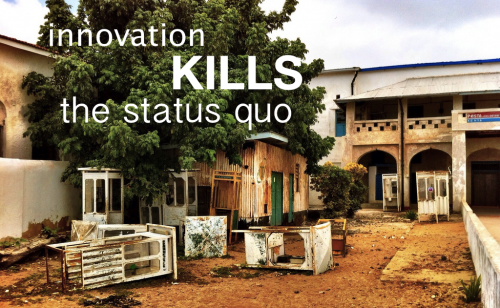I’m in Oxford for the Skoll World Forum on social entrepreneurship, and this afternoon I took part in an event called Oxford Jam, where I carried on a discussion with Michael Szymanski (MEST Ghana) and Corina Gardner (GSMA) focused on “investing in tech in Africa”. It was a good session, as it was very much a discussion between the audience and ourselves.

Some takeaways:
Using the What’s There
There are a number of tech hubs and labs coming up across the continent, and each have a different focus as we all try to experiment in our space to see what works. Michael works at MEST in Ghana, which is a very focused 2 year program on training entrepreneurs, where they then invest in some of the ideas that come out. This varies greatly from the iHub model where we’re primarily trying to connect people rather than train them, which is also different from what ActivSpaces in Cameroon or ccHub in Nigeria are doing.
The Funding Gap
We’ve seen that the biggest gap in funding comes at the early, risky stage. How can we get more local angels involved in tech startups in Africa? New seed funds are starting up in some of these spaces, and it’ll be good to see how that continues to grow and if we can create a true base, a true foundation, to the startup ecosystem in the African technology hub cities.
Social Impact Investors
We’ve heard some grumbling about the social impact investment circle, that it takes a lot more effort and has a lot less return going after the money in these circles than it does just going after more traditional VCs or other investment vehicles. At the end of the day, what’s needed is to build a business, something that is sustainable and can generate revenues. That takes time, connections and capital to make happen, and the question is whether the social impact investors can keep up with the normal investors in Africa.
Due Diligence
When an investor comes into a new country it’s difficult for them to get plugged in, and hard for them to know who to trust. They need trusted intermediaries to do the initial introductions, and then a way to figure out if the companies that they’re potentially investing in are legit. This can come at a higher cost than where the investor is coming from, as the legal and business structures can differ quite a bit.
From the outside, it also looks like most people invest in people that look like them, which would explain why more of the social impact investment money being directed at Africa seems to go to people who come from Europe or the US. I’d like to see more of the social entrepreneur programs (schools like MIT and Stanford, as well as the big Fellows programs) doing more work getting out into the Asia and Africa. It seems to me that there are just as many people who come from these countries who know the real problems, and the cultural issues there, that could use some time overseas in the US/Europe, not just the other way around.
The event really starts now, where my colleague Patrick Meier at Ushahidi will be taking the stage for the opening plenary session with Judith Rodin CEO of Rockefeller Foundation, Roger Martin, Dean, Rotman School of Business, University of Toronto and Soraya Salti, Senior Vice President of Middle East/North Africa for Junior Achievement Worldwide, INJAZ Al-Arab.

